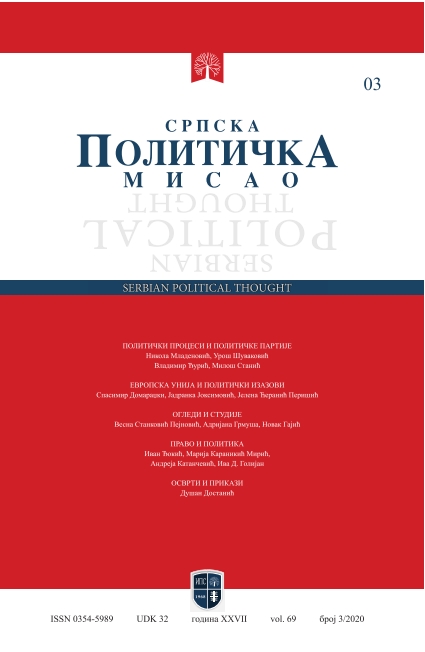POLITIČKO-SOCIJALNI OSNOVI PRAVA NA EUTANAZIJU
POLITICAL-SOCIAL BASIS ON THE RIGHTS TO EUTANASIA
Author(s): Iva GolijanSubject(s): Politics / Political Sciences
Published by: Институт за политичке студије
Keywords: Euthanasia; Mercy Killing; Active Euthanasia; Passive Euthanasia; Suicide; Responsibility; Ethics; Low
Summary/Abstract: The problem of euthanasia is a contact area of ethics, law and politics. In this text, which seeks to contribute to the expert public debate on the introduction of euthanasia into Serbian legislation, the term terminology - euthanasia (as a Right to Die with Dignity) is first terminologically clarified. Furthermore, the text considers the obligations of other persons arising out of this right and under what conditions the obligations of other persons arising from the said right constitute a restriction of their personality rights. By citing examples in the field of ethics and law, the text notes that the distinction between active and passive euthanasia is in fact a product of inadequate thinking in the implementation of this distinction. Based on the ethical argumentation of the double effect, also the text points to the inadequacy of the ethical approach in the function of legal regulation of the problem of euthanasia. In that sense, the paper concludes that the principle of double effect cannot in an unambiguous way, in principle, determine the limit within which the intention to help a vitally endangered patient turns into the intention to kill him. In palliative medical practice, it is unlikely that we will come across cases when the intention is clearly derived from a principled position. Also, it is difficult to assume that the doctor will act absolutely deontologically, without thinking about the final outcome, because these two views actually permeate, so the assessment of the outcome significantly determines the intention, and the intention indicates possible measures that should be applied thoughtfully. The text concludes that, when it comes to patient responsibility, and when it comes to physician responsibility, ethical attitudes become entangled in antinomies: (1) The moral responsibility of the patient must not be neglected, although there are conditions (and this may be true in general) , when the patient is not competent or able to make a decision; (2) However, the doctor is not morally responsible for euthanasia in that case, ie his potential responsibility is entangled in the antinomies of the relationship between genera and species, ie the principles and concrete action. but who acts in such a way that it does not lead to their realization, because he makes wrong assessments (the case of Oedipus); (3) The patient, regardless of his intentions, has the right to lifelong medical care, which must not be denied even if he clearly wishes it (ie he must be medically cared for in cases when he is unable to act otherwise, to leave the hospital, etc.); (4) The decision on important steps in order to reduce the suffering of a patient who is in the terminal phase of the disease always starts from the fact that the target is the patient, ie that he cannot be used as a means for some other purposes. Therefore, the ethical issue of euthanasia is moving from the ethical to the legal level. Using abundant literature, which, from the legal and ethical point of view, problematizes euthanasia, the author concludes that the right to dignity is a social value that needs to be lawfully formulated, so that possible abuses can be prevented - and at the same time avoiding burdening the burden of responsibility to other persons (whether or not these are subjects of the judiciary or medicine), who should implement the patient’s desire to die with dignity. Also, the author sought to base this article on the belief that Serbian legislation should legally shape the conditions for active direct euthanasia.
Journal: Српска политичка мисао
- Issue Year: 2020
- Issue No: 3
- Page Range: 343-375
- Page Count: 33
- Language: Serbian

